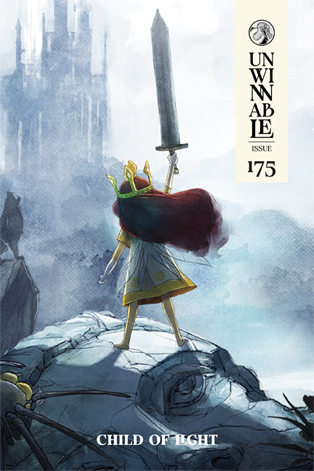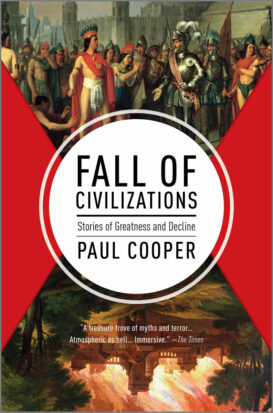
The Worst Case Scenario

This column is a reprint from Unwinnable Monthly #175. If you like what you see, grab the magazine for less than ten dollars, or subscribe and get all future magazines for half price.
———
Peripatetic. Orientation. Discourse.
———
The world has ended a thousand times before.
That is the first lesson to take from Paul Cooper’s history podcast turned multimedia project turned book (out now via Duckworth Books), Fall of Civilizations. Compiling the hours-long episodes in citation-laden prose, Fall of Civilizations retains the narrative flow and academic heft that Cooper has so artfully crafted over the project’s five-year run.
So, why are we so ready to deny it will again?
This new collection of writing from Cooper is built off archaeological and historical research, all honed for a general audience through Cooper’s use of narrative. Its 14 chapters recount the environmental, geopolitical, economic and even interpersonal events of civilization collapse ranging in time and place from Sumer’s end circa 2000 BCE to Rapa Nui’s 19th century colonization and coinciding collapse.
“I aim to tell as complete a story of the history of human collapse as could be achieved without significant repetition,” Cooper states in his introduction. The recurring themes he identifies: Climate and environmental change, social stratification/inequality, the dissolution of dependent trade networks, the violent enforcement of borders, and an unwillingness to change course. History as repetition, as rhyme, as a collection palimpsests.
I first listened to Fall of Civilizations while studying history as an undergrad (the podcast is an Ur-text for this column on apocalypse fiction), and now what I find most valuable from the project in print form is the voice of its author more directly. The text is bookended by an introduction and epilogue that begin in and return to ruins.
We begin in the present, the modern-day ruins of Saddam Hussein’s regime built atop the ruins of Babylon. “A ruin is a place the mind can’t stay quiet,” writes Cooper. Each a site where the future was canceled. A paradox. A haunting. “Every ruin in this book should thus be understood as a warning and a challenge,” Cooper writes in an explicit call to action. “Take nothing for granted, resist those who have mortgaged our future for their greed, and fight with every inch of your being to build a better world.”

It’s a powerful sentiment as Cooper connects the streets of Detroit, the pyramids at Giza, the arenas of Rome, the temples of the Maya, and the bombed buildings of Bakhmut, Mosul, Aleppo and Gaza with his historical account. And yet we still deny these are end times. Indeed, while our pop culture fills with ahistorical scenarios of the apocalypse, writers are simultaneously urging us to keep our eyes closed and our foot on the accelerator. They do this by invoking history, too, reiterating apocalyptic sentiments of yore. “There have always been doomers,” Dorian Lynskey wrote just this year, citing McGuire, Wells, Huizinga, Cyprian and more.
It’s worth asking whether people in the past thought they lived at the end times. It’s worth more to realize that despite the recurring sentiment, we do. It is the wrong lesson of history to stand amongst the ruins and proclaim “we have made it through worse before.” “All I hear is the wind slapping against the gravestones of those who did not make it,” Clint Smith replies in his 2019 poem.
The facts of climate change are unprecedented, yet while writers, politicians and artists return to denial – “climate optimism,” the commitments of the Paris Agreement, solar punk – the material reality of the world around us will not bend to spirit. It’s enough to drive someone whose studied apocalyptic sentiment, let alone climate science, a little mad. The world is ending, and we are pretending it is not! We need more manifestos on how to blow up a pipeline, not consent manufacturing of the incremental progress of carbon capture or the escapist fantasies of videogames!
I wouldn’t call Cooper’s own post-apocalypse tale optimistic, but it is hopeful. In his epilogue, the author returns to ruin: our impending one. Cooper’s version of the end of the world, however, contends not just with how humans respond to catastrophe in the historical record, but also the circumstances that make the looming reality of climate collapse unique: “We have built a machine that will destroy the world as we know it, and we depend on it to live.”
Cooper’s brief sketch of life after climate collapse, a “distant world, perhaps thousands of years in the future, [arisen] out of much death and suffering” carries a certainty I have failed to recount to the loved ones I have shared it with, so I will not attempt to again here. Instead, I’ll leave you with his own end: “We will not live to see it, but there are people who will. And one day, perhaps, one of them will tell our story.”
———
Autumn Wright is an essayist. They do criticism on games and other media. Find their latest writing at @TheAutumnWright.




